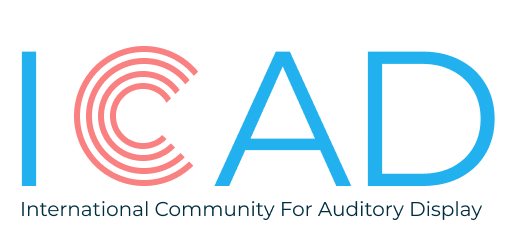ICAD is hosting the inaugural set of ABBA (Auditory Brown Bag At home) virtual talks this Thursday, June 11, and we’re excited to announce this month’s presenters and topics.
Session A at 10 AM Eastern Time (US)
TRACCE: On the trail of the travelers
Areti Andreopoulou
National and Kapodistrian University of Athens, Greece
The TRACCE project focuses on the research, design, and development of an innovative diffuse platform aiming at enriching the experience of hikers, following paths of historic significance. The platform will offer cultural interpretation services that will complement one’s hiking experience with modern information regarding each route, as well as snippets of its history (visual and auditory revival of each place reaching back to the 18th and 19th century): Users will follow the narrative and experience the journey of 18th – 19th century travelers following the same routes, while maintaining access to a variety of modern information of all places of interest.
Empathic Effects of Auditory Heartbeats: A Neurophysiological Investigation
R. Michael Winters, PhD
Brain Music Lab & Sonification Lab
Georgia Tech Center for Music Technology (GTCMT)
Georgia Institute of Technology, Atlanta, GA
Supervised by Grace Leslie & Bruce Walker
I hypothesized that hearing the heartbeat of another person would affect listeners’ empathic state, and designed an experiment to measure changes in behavior and cardiac neurophysiology. In my experiment, participants (N = 27) completed modified versions of the Reading the Mind in the Eyes Task (RMET) in different auditory heartbeat conditions (slow, fast, silence, audio-only). For each trial, participants completed two measures of empathic state: cognitive (“What is this person feeling?”) and affective (“How well could you feel what they were feeling?”). From my results, I found that the presence of auditory heartbeats i) changed cognitive empathy and ii) increased affective empathy, and these responses depended on the heartbeat tempo. I also analyzed two markers of cardiac neurophysiology: i) Heart Rate (HR) and ii) the Heartbeat-Evoked Potential (HEP). I found that the auditory heartbeat decreased listeners’ HR, and there were additional effects due to tempo and affective empathy. Finally, a frontal component of the HEP was more negative in the time-range of 350-500ms, which I attribute to a decrease in cardiac attention (i.e. “interoception”) when listening empathically to the heartbeat of others.
Session B at 10 PM Eastern Time (US)
Effects of auditory display types and acoustic variables on subjective driver assessment in a rail-crossing context
Chihab Nadri
Virginia Tech
Highway-Rail Grade Crossings (HRGCs) present multiple collision risks for motorists, suggesting the need for additional countermeasures to increase driver compliance. We sought to investigate the effect of different auditory display variables, such as display type and acoustics, on subjective user assessments. We recruited 24 participants and asked them to rate 36 different In-Vehicle Auditory Alerts (IVAAs), representing three different display types (earcons, speech alerts, hybrid alerts consisting of an earcon and speech) along 11 subjective ratings. Results showed that hybrid alerts showed better overall ratings in terms of acceptance, safety, and semantic ratings. Results also revealed that semantic variables (speech order/gender) and spatial audio should be considered. Findings of the current study can inform the design of IVAAs for HRGCs.
Here’s How to Attend
To attend, you will need to register for each event via the links at:
Session 1A on Thursday, June 11th at 10 AM Eastern Time (US)
Session 1B on Thursday, June 11th at 10 PM Eastern Time (US)
Before the meeting, registered attendees will receive a Zoom link via email. The registration is just to help us plan for the discussion and also to prevent Zoom bombing by unauthorized non-ICADers.
Interested in Presenting?
We have upcoming sessions planned for July 9 and August 13 (10 AM and 10 PM EST).
July 9 is almost full. If you signed up to present on July 9, you’ll be hearing from the July 9 session chairs soon.
There are still slots available for the August 13 session.
We want to hear about your work! We invite you to offer an informal/semi-formal presentation of around 10-15 minutes. All topics of interest to the ICAD community are welcome, including but not limited to: finished research, works-in-progress, student/thesis work, tutorials, requests for feedback on new or on-going projects, practice talks, and updates on current events in your lab. The format of the talk is flexible, so long as it is amenable to virtual presentation via Zoom.
Sign up to give a presentation here: https://forms.gle/
You will be prompted to provide a title and brief summary/abstract of your talk.
In general, sign-ups to give talks will be allocated first-come-first-serve. You’ll be asked to indicate the days and times that work for you, and the session chairs will work with presenters to try to fit everyone in to the schedule and/or to group similar talks when possible. There won’t be a formal review of sign-ups for presenters, but the session chairs will perform a light check to ensure the proposed topic fits the broad interests of the ICAD community.
Questions?
If you have any questions about the June 11 session, you can contact Michael Nees (chair of the June 11, 10:00 am EST session), Bruce Walker (chair of the June 11, 10:00 pm EST session), Thomas Hermann (chair of the July 9, 10am EST session) or any member of the ICAD board (https://icad.org/board/)
We’re looking forward to seeing you at the ABBA sessions!
